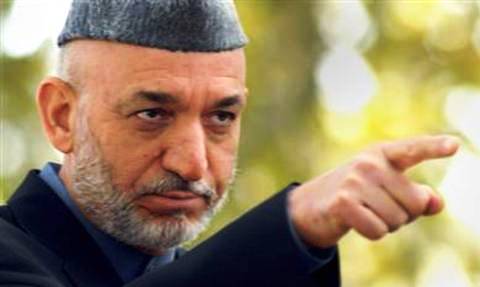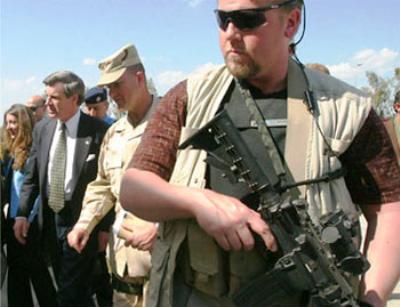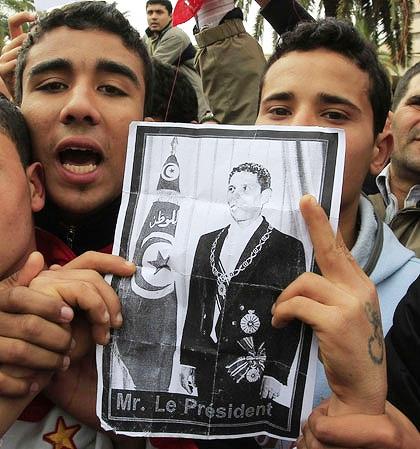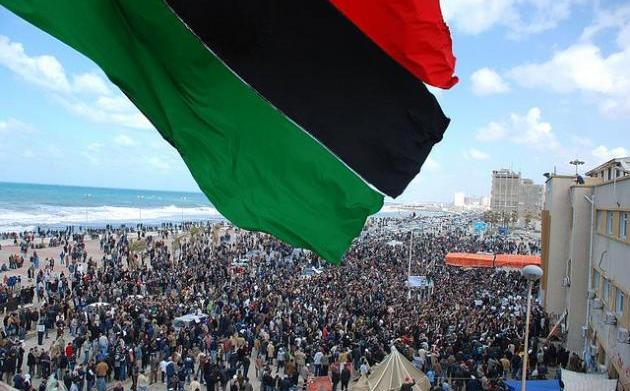On The Bush Doctrine And The Arab Spring

As the Arab Spring has blossomed into the Arab Summer, there has been an effort among members of the conservative community to align the narrative of the Bush Doctrine and the resulting endeavors in Iraq and Afghanistan with that of the Arab Spring. While promoting his memoir, Cheney claimed that the Bush Administration and its subsequent doctrine that it prescribed in the Middle East are to thank for the eruption of empowerment and action witnessed today:
But make no mistake: neither the Administration nor the President deserve any credit for the remarkable things happening now in Northern Africa and the Middle East. The only thing that the Bush Doctrine — defined by top-down, deregulated and contracted transplantation of one-size-fits-none “democracy” — deserves credit for is the “democratic” decrepitude that is so present in the leaders and institutions of Iraq and Afghanistan today.
Afghanistan’s crooked and corrupt state can largely be attributed to its President, Hamid Karzai. Chosen as interim president in 2002 by the Bush Administration, Karzai’s alleged lure was that despite being a southern Pashtun, he had good relations with the non-Pashtun and Taliban-leaning North, and could hopefully unite the two and begin the transition down an American-guided path. Unsurprisingly, this was a myopic vision on behalf of the Bush regime, as according to Abdullah Abdullah, former Karzai foreign minister and current political opponent, Karzai has only “[distanced] the Afghan government from the Afghan people” and that “the Taliban is taking advantage of this.”
The company Karzai keeps isn’t comforting either. One of the most feared and powerful opium and heroin traders in the Kandahar region happened to be Karzai’s brother, Ahmed Wali. Oddly enough, Ahmed was elected as a Kandahar province representative until he was killed in July by one of his own bodyguards.
And then there was Gul Agha Sherzai, the man who, according to The Globe and Mail, received millions of dollars from the CIA and US government to get rid of the Taliban, yet after doing so proceeded to allow them to become part of the de facto government. He was also the man who admitted to receiving $1 million a week from his share of import duties and from the opium trade. Keep in mind that most Afghans live on less than a dollar a day.

Ever-so characteristic of a Bush selection, the elections in which Karzai ran were rife with chicanery and general corruption, along with ‘support’ from people like Karim Khalili, current Vice President who has also been accused of war crimes and killing thousands of people. And we thought quail hunting gone awry was bad. After being confronted about the alleged ballot stuffing and intimidation, all Karzai had to say was that “there was fraud in 2004, there is today, there will be tomorrow.”
The leadership, or lack thereof, is well noted among Afghans. In a recent survey conducted with over 1,250 Afghans from 13 provinces, half of them admit to paying for bribes, and 60% think that Karzai’s government is more corrupt than the Taliban, the mujahedeen or Communist regimes. As far as cost is concerned, it ranges from the equivalent of $50 to $300 to vote in a National Assembly election, and $6,000-$8,000 for a court appointment. But don’t worry about any of this messing with the picturesque portrait of progress: Afghanistan doesn’t have conspiracy or racketeering laws that would allow for prosecution. And furthermore, the Karzai government has derailed the few investigations that have been initiated.

Par for the course in American foreign policy, applying a new strategy to one country simply wasn’t enough for its ambitious authors. And so Bush replicated another pathogenic pod of hollow democracy in yet another Middle Eastern country: Iraq. What little Iraq lost in corruption, it gained in toothless, nominal democracy. The reasons for the US government’s entrance and intervention in Iraq were sparse and spurious at best, as was the US government’s actual presence there. Largely turning toward contractors from the beginning of the war, the Bush Administration outsourced Iraqi Army training, logistical and tactical support, translation services, and even the handling of sensitive intelligence operations to unaccountable and lawless private forces like Blackwater. This, as the bipartisan Gansler Commission reported, “essentially created an opportunity to create fraud” in Iraq reconstruction. Yet, as so masterfully decreed by Paul Bremer in 2004, contractors are immune from Iraqi prosecution.
With an equally bleak attitude, Feisal Amin Istrabadi, diplomat, supporter of US-led invasion of Iraq and principal architect of Iraq’s interim constitution, said in an interview that Prime Minister al-Maliki and “this government [has] got to go.” This coming from a man who was in Iraq when Saddam Hussein came to power. Citing the Iraqi government as an “illusion,” Istrabadi cast aspersions toward the US’ insistence in 2005 elections in that they stopped the “[development] of robust democratic institutions to buffer the influence of religious leaders” before they could even begin, thus leading to ‘sectarian doling out of Cabinet ministries.’” This, he said, brought about even more controversy and political gridlock between the Sunnis and Shiites and led nowhere except to “democratic” doldrums. However, Bush still was able to give a good speech wherein he hit the quota of liberty-lovers’ mots cles, as he called the elections a “great triumph in the history of liberty,” and stated that Iraqi sentiments were “growing in optimism and hope.” Or rather, as Istrabadi noted, “chaos and instability.”
To quote the ever relevant classic, “Clueless,” what the Bush Administration saw from across an ocean was nothing more than a Middle Eastern Monet. From far away, it’s OK, but up close, it’s a big old mess. If democracy is to function, let alone flourish, elsewhere, it must grow from the ideals and actions of its own people, not in the form of bombs based on hyperbolic threats nor from handpicked leaders and transplanted institutional structures.
However, the Arab Spring and the primary countries that it entails, namely Tunisia, Egypt, and Libya, could be more successful in their own regime changes for that very reason. Not because of President Bush. Not because of President Obama. Not because of anyone at the top, especially from such a distance. True change, as these rebellions have noticed and have acted upon, must start from the bottom up. It must start from city squares. Or, as Tunisian Mohamed Bouazazi realized, it must start from the streets.

Former street vendor Bouazazi is largely attributed for sparking the Tunisian Revolution, and by effect, the many revolutions that followed in neighboring North African and Middle Eastern countries in the months to come. Amid unemployment and corruption woes, Bouazazi lit himself on fire one morning in January after claiming harassment and humiliation from local officials and having suffered years of injustice from the hands of the Ben Ali regime. After his death, a huge amount of protests and riots ensued that gathered support from all walks of life, be it the strikes of 8,000 lawyers, labor unions, or the gathering of 100,000 plus Tunisians to rally against the government. Staggeringly, the 23-year reign of President Ben Ali ended a mere 28 days later after just one man expressed his deep disillusionment by self-immolation.
As many in Egypt suffered similar problems characteristic to crooked regimes in addition to oppression stemming from emergency law, 26-year-old Asmaa Mahfouz found a different way to incite change from the bottom-up: Facebook. The day after Bouzazi lit himself on fire, Mahfouz asked her fellow Egyptians to “demand their human rights” and voice their disapproval for Hosni Mubarak. A week later, Mahfouz took to Tahrir Square in Cairo. 50,000 others joined her. The next week, Al-Jazeera correspondents estimated that there were at least 250,000 protestors present. There was stiff government repression and a $3,340 fine awaiting Mahfouz, but not even a month after one young woman reached out to her own citizens, the constitution was suspended, parliament was dissolved, and Mubarak, like Ali, was gone.

Libya unfolded on its own trajectory. Rich in oil resources — especially in the eastern region — and after much attention to the very public and brutal military repression in the streets of Tripoli, intervention from the United Nations and NATO came, stemming from the 2005 Canadian-crafted “Responsibility to Protect” policy. While the intervention came from the air rather from the ground, the general concepts and spirit of the Libyan Revolution remain consistent with its predecessors in Tunisia and Egypt. It was not brought to the people; it was created and fought by them. From teachers to oil workers to lawyers, the Libyan people gathered in January to rebel against what they saw as unjust, thereby garnering interior support and funding from the oil-rich Warfalla, Tuareg, and Maghara tribes of the Zuwayya region, as well as the Arabian Gulf Oil group, the second largest state-owned oil company in Libya.

Perhaps learning from the errors of the Bush Administration, US involvement was much more limited, which allowed the changes and fights to grow organically. The fight against that inhuman and insane tyrant is far from over as, like barnacles stuck on boats, it’s usually the oldest, ugliest, and most repulsive ones that are hardest to get rid of. Yet despite the depressing amount of deaths and human rights violations, there have been some positive developments. Many of Gaddafi’s former generals have defected, foreign ministers have fled, and the National Transitional Council has been recognized by the European Union, the United States and the Arab League as the legitimate representation of the Libyan state. Recently, the head of its council, Mustafa Abdul Jalil, has stated that women will play a more active role in the new Libya and a “moderate Islam” will be practiced.
While the reason for Vice President Cheney’s recent attachment to the Arab Spring as a personal resume builder may have a great deal to do with feeble revisionist hopes to make his biography in future history books a little more rosy (or, well, lifelike), it may also have something to do with the fact that he continues to be a great proponent of the Bush Doctrine. In many ways, Cheney simply cannot fathom the thought of democracy coming into its own without the heavy handed and preemptive involvement of the United States in planting of all the seeds and promising to pick all the weeds, even if, as we’ve seen in Afghanistan and Iraq, that only means picking one just to plant it in charge.
And if that’s the case, maybe he’s right. It’s uncertain what will develop in the coming months and years in Tunisia, Egypt, and Libya. Recently, Egyptian security forces made headlines by storming Al-Jazeera headquarters in al-Ahram and confiscating transmission equipment. Yet today, the Ennahada party of Tunisia has tipped the upcoming post-revolution election polls with a manifesto that promises “to safeguard religious freedom, the rights of minorities and the status of women.” Along with a watchful eye of the international community, the future of these countries that have fought long and hard for the change that they currently live is in their hands. But that is not a problem; rather, that is how it should be.
Savannah Cox is a Foreign Languages/International Studies and Political Science double major at Bellarmine University, and has recently returned from the University of Granada, where she studied Spanish and Political Science. She has interned for the World Affairs Council of Kentucky and Southern Indiana as well as Congressman John Yarmuth. In her free time, she enjoys reading, strumming a ukulele, and consuming large amounts of salty carbohydrates.










“Cheney simply cannot fathom the thought of democracy coming into its own without the heavy handed and preemptive involvement of the United States…”
nor can he fathom any other enterprise (of which he approves) occurring that wouldn’t owe its happenstance to an authoritarian entity or figure, because such is the conservative world view: conservatives, which is to say Republicans, are the “adults” , they are “serious”, they are “real Americans”, they understand “leadership”, their opinions are the only ones that matter, their actions are inherently correct and best, every positive outcome is due to them and every negative is someone else’s fault, any facts that undermine their perspective on any subject must be dismissed, ignored, distorted and damned as lies or heresies.
The only use that conservatives (Republicans) really have for democracy lies in the opportunity to exploit democracy’s inherently diverse and accommodating structures and forces to confound the possibility of consolidates challenges to their elitist, materially and philosophically self-serving agenda.
Claiming credit for the “Arab Spring” is indeed revisionist and of course insincere but necessary to snatch political and philosophical victory from the jaws of defeat, and to co-opt what is seen as democratic victory and twist into a victory for conservatism.
I couldn’t agree more.
Bush is devil. Just shit made person